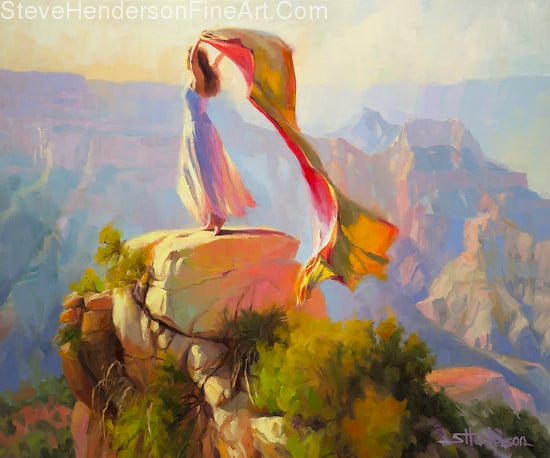
Signs and wonders: they fascinate us. We marvel at the crossing of the Red Sea, Jesus’ feeding of 5,000 and 4,000, even Gideon with his soggy sheep fleece.
One part of us asks, “Is this really true?” while another part says, “Do this for me, God! Do this for me!”
And within contemporary Christian culture, we are often encouraged to “ask for a sign,” because, we are assured, Gideon did this (multiple times), and God honored his request. He can do no less for us, we’re told, and indeed, if we have enough faith, we force His hand.
Good or Bad, We’re Not Gideon
But we’re not Gideon, my friends, (Judges 6-8) and God isn’t asking us to wipe out an overwhelming Midianite enemy by shouting, blowing on trumpets, and breaking jars. If the story of Gideon tells us anything, it’s that God gets the credit for winning our battles. Gideon’s story isn’t one extolling a man’s faith, but rather his reluctance, and God’s gracious understanding of that fear.
After Jesus fed the 5,000 with extremely limited resources, He was approached by the Pharisees, who tested Him (this is a telling phrase) by asking for a sign from heaven. He replied by sighing,
“Why does this generation ask for a miraculous sign? I tell you the truth, no sign will be given to it.” (Mark 8: 12)
“But the Pharisees were bad,” it’s tempting to reply. “And I’m good.”
I’ll send you to Luke 18: 10 for that one, but right now, let’s keep reading in Mark 8, verses 14-21, when Jesus cautions His disciples to “Watch out for the yeast of the Pharisees and that of Herod.”
It Doesn’t Have to Do with Bread
Clueless, like us, that they are, the disciples were convinced that somehow, Jesus was talking about bread, which they they presently lacked. But immediately before this passage is the encounter with the Pharisees, asking for a sign. If the Pharisees hadn’t been there for the whole bread event, they had to have at least heard of it. And apparently it wasn’t enough.

Consider this: perhaps an aspect of the yeast of the Pharisees is this insistence upon a sign. And the problem with asking for signs is that they are never enough.
It doesn’t matter what we ask for: if we get it, the first thing we do is figure out why it happened, and settle upon a natural explanation. Once we get that, we say,
“But that’s not really a sign, Lord. Give me a real one!”
Don’t believe me? Mention the Red Sea to the average skeptic (and this includes many Christians), and he’ll say, “Oh, there was a wind, and it blew the water back,” or, “The water was only 2 feet deep,” which makes you wonder how the Egyptians drowned in it.
There Have Been Signs Already
“If they do not listen to Moses and the Prophets, they will not be convinced even if someone rises from the dead,” Abraham, in Jesus’s parable, tells the rich man in hell who pleads that someone go warn his still living brothers. (Luke 16: 31)
Signs are never enough.
The desire for signs also distracts us from the real thing — Jesus, and our faith in Him. When we insist upon a sign as evidence that Jesus has heard, and will do something, about our prayer, His goodness, and His compassion, and His love are dependent upon whether or not He sends the sign. If He doesn’t, then we doubt Him, not the wisdom, or lack of thereof, of our prayer. We are more interested in what Jesus can do for us, then we are in Jesus ourselves:
“I tell you the truth,” Jesus tells a group who sought Him out after He fed the 5,000, “you are looking for me, not because you saw miraculous signs, but because you ate the loaves and had your fill.” (John 6: 26) These people didn’t even want a sign; they just wanted more food.
How about THIS Verse?
A popular verse, when it comes to justify asking for a sign, is Isaiah 7: 10, in which the Lord tells Judah’s King Ahaz, “Ask the Lord your God for a sign, whether in the deepest depths or in the highest heights.”
Ahaz’ response is interesting: “I will not ask; I will not put the Lord to the test.”
While we frequently express our doubt in God’s goodness by demanding a sign, Ahaz was reluctant — 1) because he didn’t want to put God to the test but additionally 2) because he still doubted God, even when encouraged to trust Him. It’s a thought.
If you, like Ahaz, are strongly encouraged to ask for a sign, then follow God’s leading — but make sure it’s God’s leading. You’ll be less likely to be fooled by the voices in your head, or Satan’s whispering over your shoulder, if you find, and read, the many promises God has given us in His word that He hears our prayers (Psalm 34: 15, 2 Chronicles 7: 14); He will never abandon us (Deuteronomy 31: 8); and He knows our needs (Matthew 6: 8, Luke 11: 13).
Trust God, not wonders. Seek Jesus, not miracles. Ask for wisdom, not signs. Then, when the wonders and the miracles and the signs occur, you will be able to discern which are from God, and which are not.
Thank You
Thank you for joining me at Commonsense Christianity, where I have spent many fruitless hours praying, looking for, and expecting a sign, when Jesus just wanted me to look for Him instead.
Posts similar to this one are
When Our Dreams Never Come True
Trust God and Get Your Jammies on
God Is Not as Inept as We Think He Is

